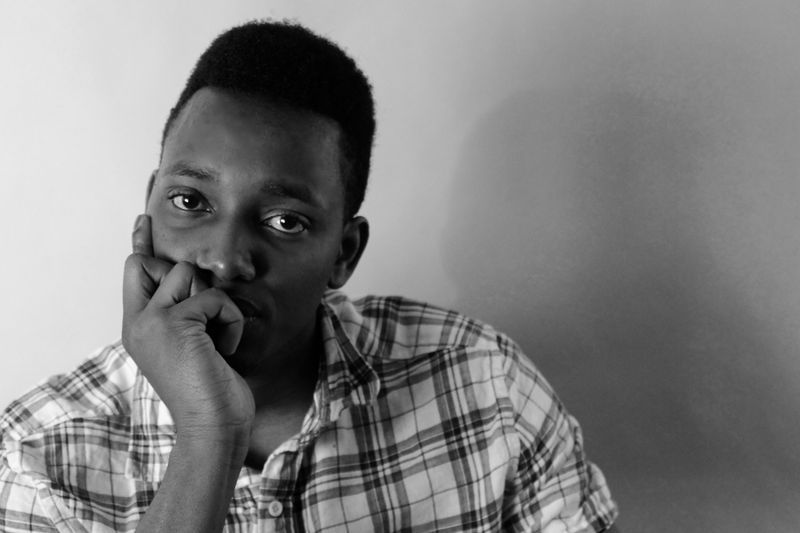We Are America
Lessons From My Mother
By Robert

Lowell High School, Lowell, Massachusetts
‘Why do you always get me up this early?’’ I asked my mother. It was 5 a.m. and we were on our way to the garden to farm. I was ten years old at the time.
I remember her response, said with a sassy laugh, “You don’t understand life! There will be a time when I won’t be there for you. The world may seem beautiful and innocent in your eyes but it’s not a bed of roses. Good things come to those who get out and make them happen.” I shook my head, not understanding and deciding not to question her because I always got life lessons instead of simple answers.
I grew up in The Democratic Republic of the Congo. My village Burasi was typical, with streets of mud and thatched huts. Our house had a single room and a low door that required us to bend in order to enter. In the center burned a fire. Spears, bows, quivers, and nets hung from the walls. My mother wore colorful quembe wraps. She was a tall dark chocolate woman with an honest smile, a patient and pure heart. She oversaw my first steps. She opened my eyes to the beauty and vile of the world. Everyday we worked in the garden together and closed the day milking the cows. It was a normal happy life. But there was also always fear, for the Lendu tribe often raided my tribe, the Hema, looting property and killing my people. The government did nothing.
Life turned upside down on one dark night in 2010 when I was twelve. It was the night our village was raided by the Lendu. My mother fled in one direction, I fled in another. Later I was told she did not survive. That night I fled with other survivors. We crossed the river using small canoes that carried three people at a time, but due to our panic, six would go in one. I was desperate and lost. I couldn’t accept my mother was gone. I had sleepless nights and days with tears, feeling dead and also wanting to die. I can’t find words to describe that time.
In Uganda I knew no one and had nothing, except for the clothes I was wearing. I lived near the border for three years with different people. I worked grazing cattle to survive, something that required discipline and humbleness. I got up at 5 a.m., an experience I had had my entire life with my mother.
Three years later, I was sent to a refugee camp. But in a surprise coincidence, I ended up meeting a new family, relatives from my dad’s side who I had never met. I was so happy to find family again. Life in the refugee camp wasn’t easy. You lived with no choices but to survive. I learned to speak ten languages just to communicate with all of the different people. Resources were limited, there wasn’t enough water, food, or clothing. We lived in tent houses, one room for the entire family. Working hard and sticking to my mother’s words kept me away from troubles. My mother used to tell me education was the best thing I could have and that education could never be taken away. And so I looked to school as my hope for a better life.
When I was 17, I was astonished to hear I could move to the United States with my family. I couldn’t imagine how life would be, but I hoped it would be better. I got the chance to attend Lowell High School, which changed my life completely. Here, I have met tremendous people who have recognized, accepted and supported me spiritually, academically, and emotionally.
I now understand my mother’s answer to my questions all those years ago. I have learned that our parents’ words can guide us even in their absences. Everywhere I have gone her lessons have been the key to opening doors in my life.
© Robert. All rights reserved. If you are interested in quoting this story, contact the national team and we can put you in touch with the author’s teacher.